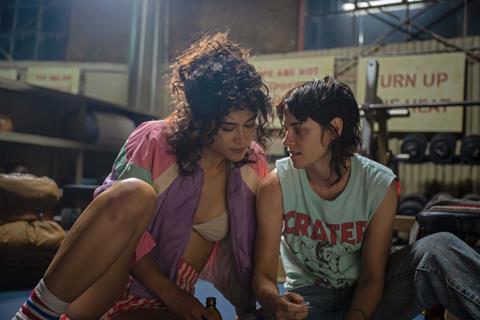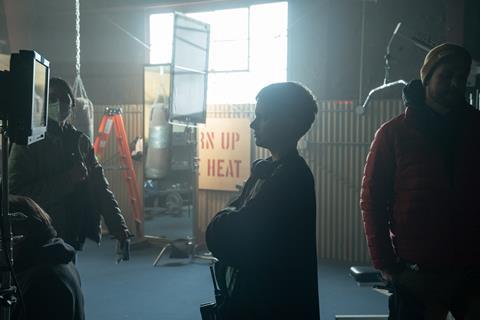UK filmmaker Rose Glass tells Screen why her queer crime thriller Love Lies Bleeding had to be set in America.

Rose Glass refused to give herself time to consider a sophomore slump when her debut feature, low-budget religious horror Saint Maud, premiered in 2019 to huge critical acclaim. “I just thought, ‘As long as I push a little bit further in a different direction to what might be the most obvious thing to do next…’ — that felt a good idea at the time,” explains the UK filmmaker.
That new direction led Glass — a Screen Star of Tomorrow in 2018 — to 1980s Albuquerque, New Mexico for the setting of her pulpy romantic crime thriller Love Lies Bleeding, which plays as a Berlinale Special Gala following its Sundance premiere, and is the opening night film at Glasgow Film Festival. Kristen Stewart leads the UK-US co-production as an introverted gym manager whose criminal father and new bodybuilder girlfriend pull her into a world of violence and chaos; A24 handles international sales.
Glass was initially intimidated by the idea of making “an American movie”. An early iteration had set the film in Scotland but, as she delved into the story with co-writer and friend, Polish filmmaker Weronika Tofilska, transplanting the narrative Stateside seemed like a more natural fit. “I’ve never been to that bit of the country at all, but that was the fun thing about it,” Glass says. “We were writing this kind of make-believe, mythological version of America.”
The pair started to write the script officially while Saint Maud was in post-production, and Stewart was always in the director’s mind. “It was less to do with characters I’d seen her play and more to do with the little I knew of her and how she comes across in real life,” Glass admits. “It just felt like fairly close to how this character was shaping up anyway.”
Getting the newly Oscar-nominated actress on board proved surprisingly easy after the pair hit it off at a “temperature check” first meeting. “She sent me a nice message afterwards saying she was up for it, which was a relief because I thought I’d done a terrible job of trying to pitch it to her,” says Glass, with a laugh.
Finding Stewart’s partner in crime was a less instinctual process, with Katy O’Brian auditioning six times for the role. Both women identify as queer though Glass stresses this was “certainly never a condition” in the casting process. “If it feels real when you’re watching them, that’s all I’m interested in,” she adds.
Champion ensemble

Glass reunited with a “dream-team combination” of Saint Maud producers Andrea Cornwell and Oliver Kassman along with Film4, which developed and co-funded her first feature, and A24, which took North America rights. As co-financiers on Love Lies Bleeding, Film4 and A24 gave Glass a budget multiple times bigger than that of her $2.5m (£2m) debut. “I did feel out of my depth at times,” she admits. “You’ve been given all the goodies and ingredients and then you feel a certain responsibility to try and make the most entertaining film possible.”
Production took place over the summer of 2022, taking advantage of New Mexico’s tax breaks. After a first cut was put together, Glass went back and wrote in “new little beats” which were shot a few months after filming wrapped. A similar process was deployed with Saint Maud.
The director is surprised this might be considered unusual, suggesting that it should be an “integral, built-in part” of filmmaking. “It’s often the small, joining-tissue stuff that you can’t figure out until you’ve actually got the thing in front of you and you’ve shot it,” she says. “There are some moments in both films that came up in that process which became some of my favourite beats.”
Glass “felt about a stone lighter” after Love Lies Bleeding premiered at Sundance and was met with rapturous applause and a vocal reaction at its late-night screening. Returning to the Berlinale seven years after participating in its talent campus, the director is curious as to how the film will fare with European audiences. “We’ve all got theories about whether people are going to laugh in different places,” she says.
All eyes will be on which direction Glass goes next. The filmmaker is tight-lipped but reveals she has been writing her third feature since Sundance — solo this time. As for other projects, Glass jokes she does not yet have the “mental strength or stamina” for TV directing, nor is she looking to direct scripts from other writers for now. “Maybe I’m more of a control freak than I ever thought I was before I started making films.”

























No comments yet